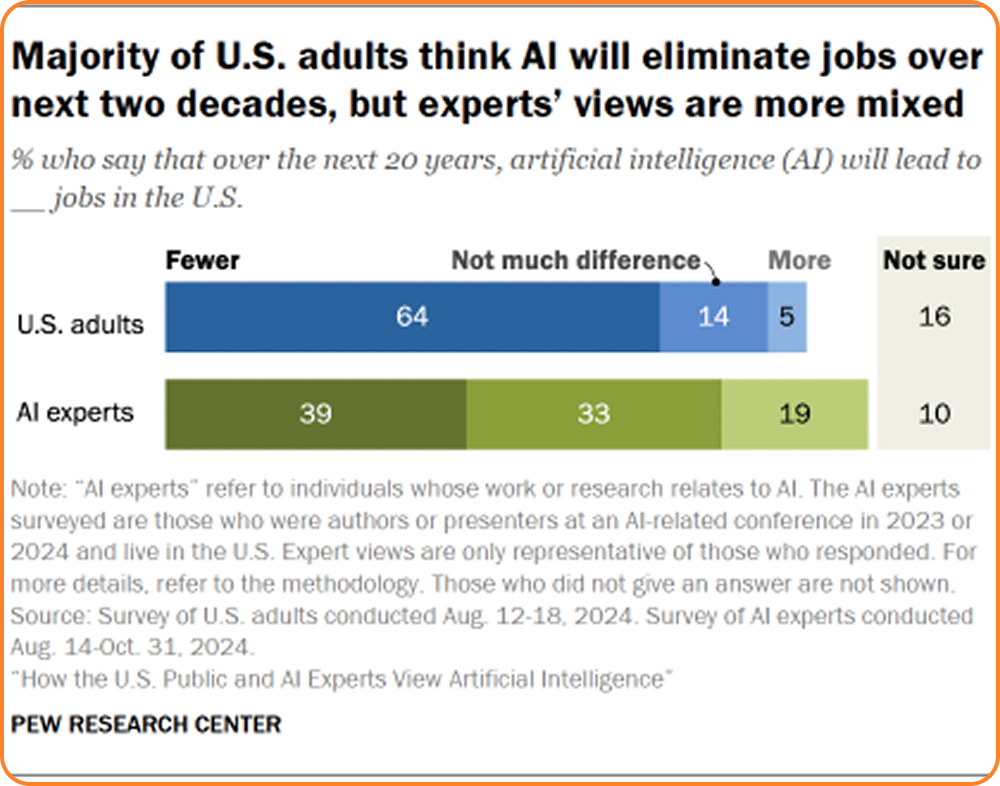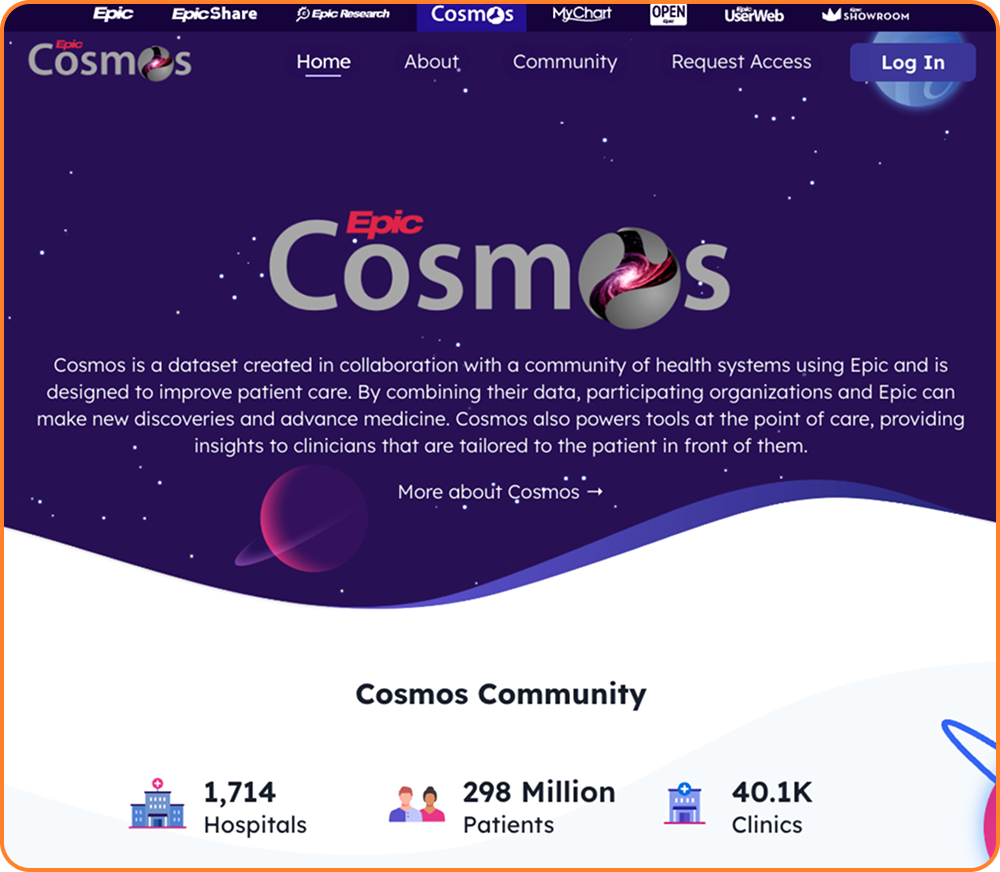Imagine your mom asked you about AI—odds are, she'd be way more worried about robots taking jobs than excited about cool new features.
That's because there's a massive disconnect between how experts and regular folks view artificial intelligence, according to brand new Pew Research data.
In what might be the most comprehensive comparison of its kind, Pew surveyed over 5.4K regular Americans and more than 1K AI experts to see how they feel about our AI future.
The results? Let's just say your AI doomer friends and your AI optimist friends are both cherry-picking their facts.
The gap between experts and the public is striking. While 56% of AI experts believe AI will positively impact the U.S. over the next 20 years, only 17% of the general public shares that optimism. And while 47% of experts are more excited than concerned about increased AI use in daily life, that drops to just 11% among regular Americans.

Here's where things get really interesting: A whopping 64% of Americans believe AI will eliminate jobs in the next two decades, compared to only 39% of experts. The experts' views are much more nuanced—33% expect no significant change in job numbers, and 19% actually believe AI will create more jobs.
Both groups agree on some job categories that are at risk:
- Cashiers (73% of both groups expect fewer jobs).
- Journalists (around 60% agree).
- Software engineers (about 50% agreement).
But there are fascinating disagreements:
- Truck drivers: 62% of experts predict job losses vs. just 33% of the public.
- Teachers: 43% of the public expects job losses vs. only 31% of experts.
- Medical doctors: 28% of the public foresees job losses vs. just 18% of experts.

Then there’s the representation problem. In a finding that won't shock anyone who's worked in tech, both groups see significant gaps in whose perspectives get included in AI development. About 75% of experts believe men's views are well-represented in AI design, but only 44% say the same about women's perspectives.
The racial disparity is even more pronounced. While 73% of experts say White adults' perspectives are well-accounted for in AI design, that drops to 50% for Asian adults, and only about a quarter say Black (27%) or Hispanic (25%) adults' perspectives are adequately represented.
Also, gender matters—a lot. Among AI experts themselves, there's a massive gender gap in outlook. Male experts are dramatically more optimistic, with 63% saying AI will positively impact society versus just 36% of female experts. Men are also much more likely to be excited rather than concerned about AI (53% vs. 30% of women) and to believe AI will personally benefit them (81% vs. 64%).
Where does everyone agree? Regulation. In a rare point of consensus, both experts (56%) and the public (58%) worry more about insufficient government regulation than excessive regulation of AI. The only major disagreement here is between academic and industry experts—60% of university-based experts lack confidence in companies to develop AI responsibly, compared to 39% of those working at private companies.

Here’s some additional insights we found fascinating:
From Chapter 1: Artificial intelligence in daily life: Views and experiences:
- AI experts believe the public engages with AI far more than the public reports - 79% of experts say people interact with AI “almost constantly or several times a day” vs. only 27% of the public who think they interact with AI at this rate.
- Only one-third of U.S. adults have ever used an AI chatbot, compared to nearly all AI experts (98%).
- Most Americans (72%) have at least heard of chatbots, including 28% who've heard a lot
- Among chatbot users, experts had far more positive experiences - 61% of experts who used chatbots found them “extremely or very helpful” vs. only 33% of the public.
- Among the public, 59% feel they have little or no control over AI use in their lives, compared to 46% of experts.
- 26% of the U.S. public is unsure how much control they want over AI, compared to just 4% of experts.
- Female AI experts want more control than male experts - 67% vs. 54%.
- Experts at colleges/universities are more likely than those at private companies to want more control over AI (61% vs. 50%).
From Chapter 2: Views of risks, opportunities and regulation of AI:
- The public has become more concerned about AI over recent years - the share who say they are more concerned than excited increased from about 40% in 2021-2022 to roughly 50% in 2023.
- Specific concerns among experts include data privacy issues (like airport biometrics) and misinformation “at scale.”
- Among experts' specific concerns, data misuse, bias and inaccurate information show the largest gender gaps - women experts are much more concerned about these issues than men.
- On representation in AI design: only 50% of male experts vs. 27% of female experts say women's perspectives are well accounted for in AI design.
- Among experts, women are somewhat more optimistic than men when asked about men's views being represented in AI (86% vs. 73%).
- Experts noted representation issues for minority communities, with one Black expert describing AI generating only biracial families when asked to create images of a Black family.
- A White expert noted bias in AI comes from training data being scraped from the internet, which “comes from wealthy Western countries, wealthy White countries, and in particular along the coastline of those countries.”
- Political differences: Republicans are more likely than Democrats to lack confidence in the government to regulate AI effectively (70% vs. 54%).
- However, Republicans and Democrats are equally likely to say they lack confidence in companies to develop and use AI responsibly (around 60% for both).
From Chapter 3: Public and expert predictions for AI's next 20 years:
- Among AI experts, those working for private companies are somewhat more optimistic about AI's future impact than those at universities (63% vs. 55% believe AI's impact on the U.S. will be positive).
- The public is generally more uncertain about AI's future impacts, with about a quarter unsure of the impact on criminal justice (28%), personal relationships (24%), or elections (23%).
- On AI and elections: 61% of experts and 50% of the public believe AI will harm elections in the future.
- On AI and news: 56% of experts and 51% of the public predict AI will negatively affect the news people get.
- Significant gender gaps exist among experts regarding AI's impact on education: 68% of male experts say AI's impact on K-12 education will be positive vs. only 42% of female experts.
- Similar gender gaps exist for the environment (43% vs. 18%), medical care (89% vs. 72%), and the economy (74% vs. 57%).
- On the question of whether AI will develop independent thought: 40% of the public believes this will happen in the next 20 years, while 48% of AI experts think this is unlikely.
- The public is more worried about AI causing major harm to humans than experts are (35% vs. 20%).
- Both groups are skeptical that AI will make humans happier: only 6% of the public and 22% of experts think this is likely.
- Most of the public (63%) say AI will never reach a point where they would trust it to make important decisions for them, while roughly half of experts think AI will eventually reach that point.
- Gender differences on trusting AI with important decisions are stark: 58% of male experts vs. 30% of female experts say they would eventually trust AI with important decisions.
Our take: The most important finding here isn't even explicitly stated: the massive uncertainty regular people feel about AI. Between one-third and nearly half of Americans answered “not sure” to many questions, suggesting a major knowledge gap that the industry needs to address.
While experts clearly see more upside than the public does, both groups recognize that AI has serious risks. The agreement on regulation suggests a potential path forward—if we can create better safeguards and more inclusive development processes, perhaps the benefits experts envision can be realized without the harm the public fears.
And next time someone confidently tells you “AI will definitely take all our jobs” or “AI will definitely NOT take our jobs (or create more jobs than it eliminates),” remind them that even the experts aren't that certain.







